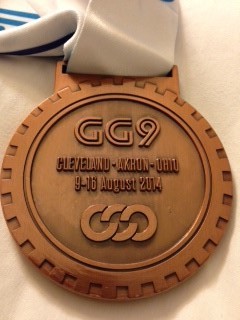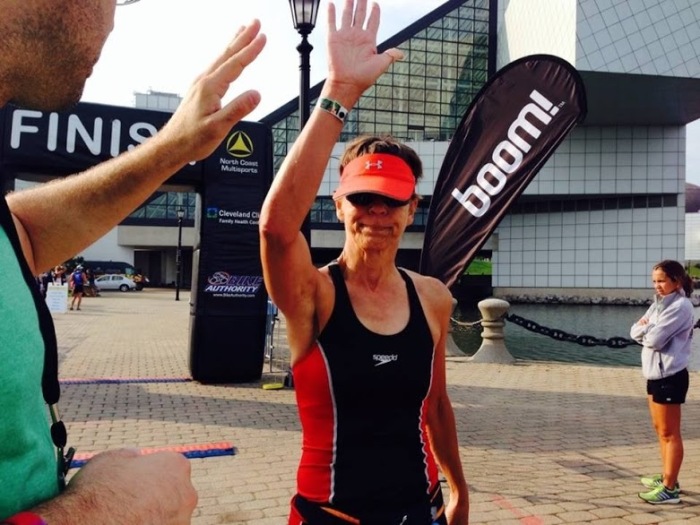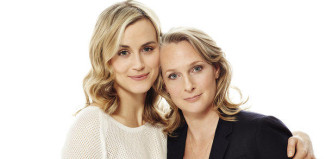At 19, Dana Markus-Wolf knew exactly what she wanted to do: own a land surveying company. Quite a vision in 1977, when women in the industry were even scarcer than they are now. And she achieved her dream: Her company, Landmark Surveying, LP—a certified Women-owned Business Enterprise (WBE) and one of fewer than 50 gold-level sustainable businesses in Austin—celebrates its 20th year in business this week. Landmark specializes in design, construction, commercial, and residential surveying.
Her barrier-breaking extends beyond the professional realm. At 56, as the second-oldest participant, Markus-Wolf took bronze in the women’s sprint triathlon at this summer’s Gay Games in Cleveland. She covered the 750-meter swim, 16-mile bike, and 3.1-mile run in 1:40:59, beating everyone in her age group and all but 16 men. Quite an accomplishment considering she’s only been in the sport six years and completed 13 races.
Congratulations on Landmark Surveying’s 20th anniversary. I imagine surveying is still a male-dominated profession.
Seriously dominated. My mother suggested I be a land surveyor, which was out of the blue, because there weren’t any women in land surveying.

Images provided by Dana Markus-Wolf
How has your gender affected your career?
Yes, both negatively and positively. The negative part is mostly associated with working in the field: having to battle over a shovel, the sexual innuendos, you hear the guys talk about their wives in a really negative manner. No one wanted to make me a crew chief, and then when I got into the office, nobody wanted to bring me up the ladder to management level.
The good part about it is, once I got to the management level, I was treated very well, and once I earned WBE status, companies started asking me to team with them. If I were a man, I would not have that luxury. Also, to have a woman’s point of view in a male-dominated business is awesome. I feel like it’s made our company special.
Have you noticed a change in the climate for women in the business over the past 20 years?
There are a few more women in the profession now. There also are more women than ever in government positions leading projects, and it’s wonderful to see a lot more women engineers. But in the private sector, male developers still prefer to work with other men. So there is a difference now, but not as much as we would have hoped would have taken place over 20 years. We don’t want to be placed on a pedestal nor do we want to be considered less than. Finding that equality is a continuing effort for us.
Do you have an anniversary celebration planned?
Landmark got its start at a local pub, and so every year we go back to that pub and celebrate. We offer food and drink for everybody at the company and their significant others for a couple of hours. I’ll give my annual speech and hand out some bonus money.
You started competing in triathlons when you were 50. Had you been involved in sports before that?
Only a little, in my early 30s for about two years. I was in an adult fitness swimming program at UT. The coach went on to coach a master’s team, and I followed him.
Why triathlons, and why at age 50?
When I was swimming, I found out about triathlons from this young woman gung ho about doing a Danskin race. Her energy and spirit caught me up in it, and I thought maybe I would want to do it. But I’d never been a runner and I didn’t have a bike, so it was just in the back of my head.

Dana hikes to the top of Guadalupe Peak
Also, a lot of people made fun of the Danskin because it was a women’s race, and therefore it couldn’t possibly be as important or intense as a men’s race. So even though I was interested, I didn’t feel like it was something I could accomplish, and I didn’t feel like it was something that was going to be around very long.
Then I turned 50. My beagle, Sparky, had cancer, so I walked him to keep him in shape. Sparky always pulled on the chain, and it annoyed me, so I started jogging with him, and that’s how my running began. My dad had a broken back and neck, and lung cancer. My mom was suffering from spinal stenosis and dementia. I was the primary caregiver, and the company was dealing with the economic downturn. I needed a form of stress relief.
You recently won a bronze medal at the Gay Games. How did your experience match up to your expectations?
My friend had gone to the Gay Games in Germany four years ago. I was curious about it but never thought I’d get to go. I’d won some awards, but I wasn’t a world-level triathlete by any means. But I looked it up, and it’s basically an international age-group competition open to everyone. Then I found out it was in Cleveland. Not Germany or anywhere in Europe, but here in the States—and of all places, Cleveland. I thought it would be fun, but I really had low expectations.
 When I got there I was blown away. The people of Cleveland welcomed us like we were royalty. They treated us wonderfully: so respectful, so kind, so gracious. And it was big. There was no denying the Gay Games were going on. They had a giant laser rainbow that went from Lake Erie across downtown to a skyscraper. One skyscraper was striped in rainbow colors. They had giant signs all over: Welcome to the Gay Games! They had rainbow flags everywhere. It was like being on Castro Street in San Francisco, but it was Cleveland, Ohio.
When I got there I was blown away. The people of Cleveland welcomed us like we were royalty. They treated us wonderfully: so respectful, so kind, so gracious. And it was big. There was no denying the Gay Games were going on. They had a giant laser rainbow that went from Lake Erie across downtown to a skyscraper. One skyscraper was striped in rainbow colors. They had giant signs all over: Welcome to the Gay Games! They had rainbow flags everywhere. It was like being on Castro Street in San Francisco, but it was Cleveland, Ohio.
How do you fit in training for three sports with having a life?
The social life comes with the training. But if you want to, say, go to a book group—I really enjoy the BookWoman book groups—that’s hard. Time to just go to a movie is pretty slim, and there are professional meetings and parties and picnics I can’t go to.
How has your business changed over the years?
When we first started out, we had one field crew using pretty old equipment, driving an old truck I had bought for myself personally and another used one. We were barely dealing with AutoCAD. Now we’re operating five field crews. We have six vehicles, and three don’t have many miles on them. We have the latest versions of AutoCAD and drafting software, we have robot technology and GPS technology, and we are in a standalone building now that I own.
And I’m a much different person. I used to get really super angry at every little tiny thing that was out of place, and now I don’t have those strong reactions that people are afraid of. I tend to work with them better and change them and train them through more positive reinforcement. My employees have been with this company an average of eight years. I have virtually no turnover now.
What do you wish for the profession?
I really wish that more women—African-American, Asian, Hispanic, Caucasian—would get into surveying. Women who like hiking and being outdoors, who don’t have too many allergies and like doing physical work, and who are pretty good at math—I’d really like to see them fill out an application or send me their resume. And I want those who may have different gender labels to feel free as well to come by. To me, the more diversity the better. It’s too generic right now.
What are the training requirements?
We offer 100% tuition reimbursement if you take classes at Austin Community College in the evening, because we can’t hire part-time people. We train the right people—you just have to be enthusiastic, willing and able to work outdoors and enjoy it, able to physically handle the equipment, have a mind on your shoulders for math, and have a bit of a memory. It’s not rocket science.
I’m tempted. It sounds like so much fun!
It really is. They had to drag me indoors. I loved working in the field.
Interview by Jana Hunter.





































